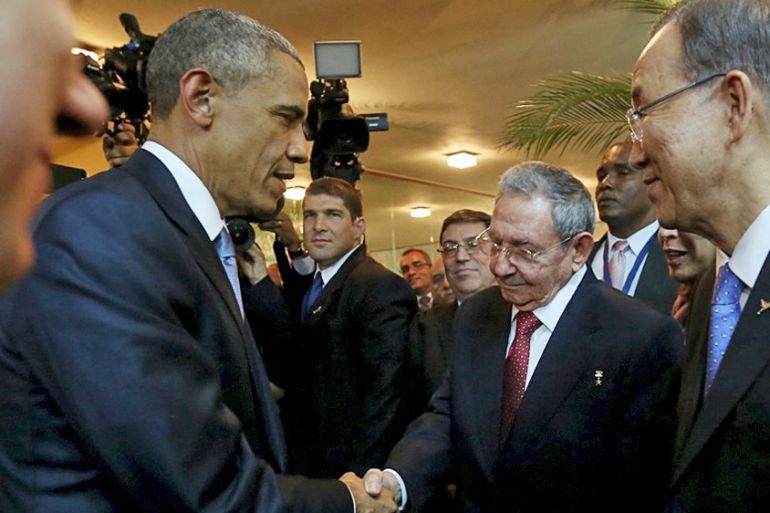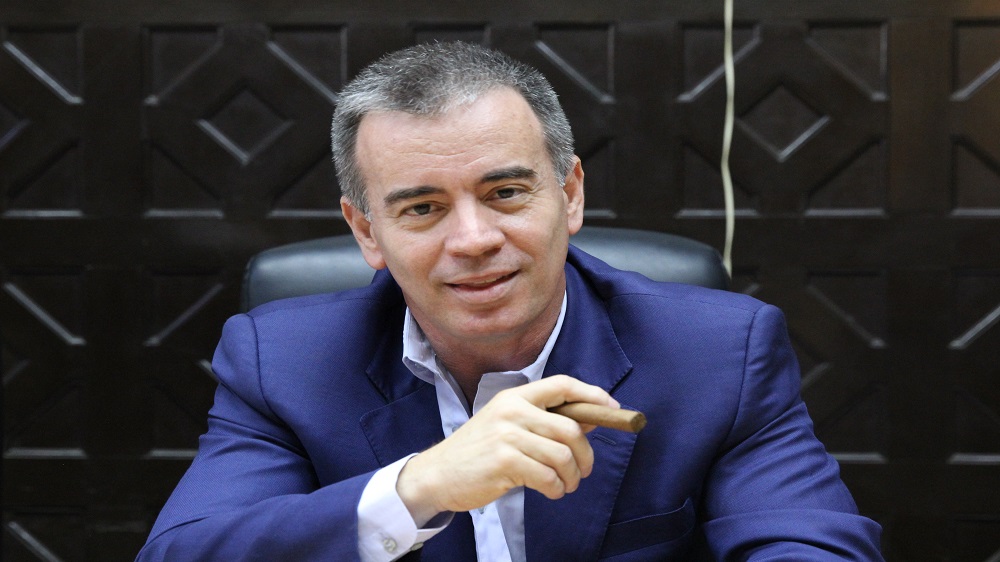Cubans sound off on détente efforts with the US
As Castro and Obama meet in Panama, Cubans give their take on potential normalisation of relations after 54 years.

Havana, Cuba – As historic meetings between Cuban and American officials continue at the Summit of the Americas in Panama, Cubans from all walks of life on the Caribbean’s largest island expressed a wide range of views on what the negotiations really mean for their country.
Al Jazeera asked what Cubans thought about the developments in Panama City, and what would result if the decades-old trade embargo imposed by the US in 1962 was finally lifted.
Keep reading
list of 4 itemsUS to allow more flight routes to Cuba in latest restriction lift
Cuba has a new leader and it’s not a Castro
A new era in Cuba?
Yecser Abel, waiter at the NH Capri Hotel
![Yecser Abel [Robert Kennedy/Al Jazeera]](/wp-content/uploads/2015/04/d585e22879b74bf680df911350b9969c_18.jpeg)
President Castro and President Obama shaking hands is a great step in history. It marks an important move in relations between the countries. The Americans I’ve met in recent years have nothing against the Cuban society. They don’t care about politics.
There’s a lot of misinformation about Cuba, but now with the internet and satellite TV, it’s impossible to keep the people blind. But the US Congress has to lift the embargo, and that will be very difficult. It will certainly take time.
Robert Vina Riesgo, retired history professor
![Robert Vina Riesgo [Robert Kennedy/Al Jazeera]](/wp-content/uploads/2015/04/244a322adcea4e20aa6716f615bc8b00_18.jpeg)
I don’t believe anything will ever happen between the US and Cuba. This just a lot of talk to help extend the current situation by keeping people hopeful.
There have been many meetings over the decades between many Cuban and American officials. They’ve never led to anything and I don’t expect to see anything substantive come out of these latest talks that will benefit the Cuban people.
Professor Carlos Alzugaray, University of Havana
![Professor Carlos Alzugaray (centre) [EPA]](/wp-content/uploads/2015/04/373304ba1a474c64ab3c09b184343643_18.jpeg)
I am an optimist. If you take out all this noise surrounding these talks, the fact remains that there are officials on both sides engaged in discussions on many different issues. Just to have these people in the same room working towards common goals is a good thing and is hopeful.
The train has already left the station, there’s no going back now. But it will be hard. We’re facing many political challenges on the road ahead.
Camilo Condis, manager of El Figaro restaurant
![Camilo Condis [Robert Kennedy/Al Jazeera]](/wp-content/uploads/2015/04/85292793ee48405d81e3164f3d2e606c_18.jpeg)
It’s great, I hope Castro and Obama will share a cigar together. In the future, this will bring even more Americans here as travel costs go down, which means many more customers for us. Everybody wants to see Cuba before the changes and through the changes.
But we don’t want to lose all the great things from our socialist system – free education and healthcare, for example. We cannot lose all the good things our revolution has given us.
Dr Antonio Gonzalez Fernandez, health ministry’s director of international relations
![Dr Antonio Gonzalez Fernandez [Robert Kennedy/Al Jazeera]](/wp-content/uploads/2015/04/42eb0fa9060e4f3496b19342270eebaf_18.jpeg)
It’s good that everyone is walking towards peace, but this has been a very slow-moving process so far. Cuba is still on the US list of state sponsors of terrorism, and Cuba still faces banking problems in the US.
How can we move forward in relations when these sanctions block us? The blockade must end before we can seriously normalise ties.
Hirochi Robaina, owner of Vegas Robaina cigar company
![Hirochi Robaina [Robert Kennedy/Al Jazeera]](/wp-content/uploads/2015/04/ef4ddbe2160845bf904498a4db912519_18.jpeg)
It remains to be seen whether these negotiations and the eventual lifting of the blockade will really help us.
If the Cuban government makes a deal with the American resort corporations, but the hotel workers still make 400 pesos [$16] a month, then what’s the point?
Julio Simoneau, 80, retired cameraman
![Julio Simoneau [Robert Kennedy/Al Jazeera]](/wp-content/uploads/2015/04/bbd91dd92f83434a89f42cf7405dc9d2_18.jpeg)
Thank god this new generation wants to rewrite history after so many decades. This animosity between the two countries has torn families apart.
The people of Cuba and the US have always been friends. It’s not about the people, it’s the governments that created this terrible problem.
Professor Lazaro Pena Castellanos, economist at the University of Havana
![Professor Lazaro Pena Castellanos [Robert Kennedy/Al Jazeera]](/wp-content/uploads/2015/04/68ddc62184c04b42a6bb4b7b3ae8965f_18.jpeg)
These discussions ongoing are truly significant. It’s so important to have good relations with our neighbours. There are so many global problems: hunger, poverty, ecological destruction.
We need to respect each other in a civilised relationship and unite to fight the problems facing humanity. We must attack these huge problems together.
Miguel Mendoza, 73, production manager of Oscar-nominated film Strawberry and Chocolate
![Miguel Mendoza [Robert Kennedy/Al Jazeera]](/wp-content/uploads/2015/04/6b18b3770c3841edbd8e4c01494ddf72_18.jpeg)
Cuba is now being prepared for the moment [of the embargo’s end] and economic change is already happening.
But if the embargo is lifted today, that means there can be no more excuses from the Cuban government about the poor economic situation.
Jorge Luis Fernandez Maique, commercial vice president of Habanos Cigars
 | |
|
It’s great news that for the first time Cuba and the US have started talking on normalising relations.
From the point of view of Habanos, the United States represents two-thirds of the global cigar market. Once the trade sanctions are lifted, that opens up 65 percent of the world market to us. With close a distance and good prices, that bodes extremely well for our company.